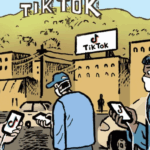Microsoft will be the first to tell you that successfully implementing new technology means learning from your mistakes.
That’s what Microsoft spent the last several years doing since the launch of Bing Chat, their first AI assistant in 2023. Their most recent iteration of Copilot, described as an “AI companion,” is a far cry from Bing Chat – and definitely for the better.
What’s wrong, what’s right
Microsoft’s early-stage AI assistants weren’t nearly as complex or effective as today’s iteration. Bing Chat functioned similarly to a search engine, according to Paul Longo, Microsoft’s general manager of AI in Ads, who elaborated on the topic during a session on Wednesday at AdExchanger’s Programmatic IO in Las Vegas.
Users would pop in, look up their search query, then close out of the tab. Over time, Longo said, Microsoft developed a more personalized search companion, Copilot, which, as of April, now features stored memory. And with memory comes massive improvements – namely, a learned awareness of users’ likes and interests and the ability to refer back to prior conversations.
Initially, ads were only incorporated into Copilot during “commercially relevant” conversations, Longo explained. And in many ways, this proved successful. Microsoft saw higher click-through and engagement rates along with better conversions.
All of that sounds great. So what went wrong?
Consumers thought “the entire experience was an ad,” said Longo. They weren’t seeing a clear distinction between organic versus paid results.
But Microsoft didn’t view these blips as setbacks or failures. Rather, they paved the way for a better tool.
“We stubbed our toe,” said Longo. But that uncomfortable experience led to new standards for future products.
“We learned a lot,” he said.
The principle of the thing
Microsoft came up with three guiding principles to determine the best way to incorporate ads into conversational AI experiences.
One is that sponsored placements should never affect Copilot’s organic results, ensuring that the AI companion remains a “trusted, unbiased advisor,” as Longo put it.
Copilot ads are also clearly labeled, so the user is clear on what part of the display is an advertisement as opposed to an organic result (in direct contrast to the aforementioned toe stub).
Lastly, ads are only delivered in what Longo described as “highly relevant conversational scenarios,” where an “ad voice” can explain to the user why they are receiving that particular ad.
Microsoft has seen performance improvements since introducing these principles. But improving the ad experience is just part of a larger goal for Microsoft. It wants its products to gain adoption. And Longo said these changes help the company improve its consumer trust levels.
Consumer confidence in the ad experience actually matches confidence levels in an ad-free experience, he said.
And that’s because the user is part of the process, and the human is the one who generates results.
That necessary level of human control and knowledge is why the best AI solution is implemented as a copilot, Longo said. There’s a reason the product isn’t called Autopilot.














